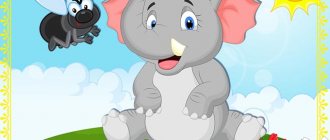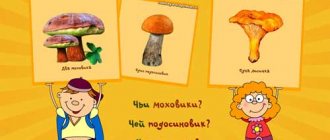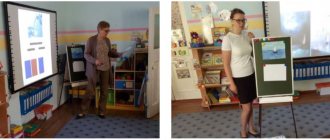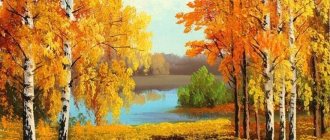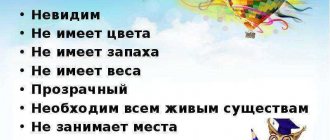Extracurricular event “The Earth is our common home”
State budgetary special (correctional) educational institution for students and pupils with disabilities general education boarding school VIII type of the village of Shkurinskaya, Krasnodar Territory Extracurricular activities -
“The Earth is our common home” Prepared by: Inna Aleksandrovna MovchanTeacher of GBS (K) OU boarding school of the VIII type in the village of Shkurinskaya, Krasnodar Territory, 2013.
Goal: to form environmental consciousness and a sense of respect for planet Earth; Objectives: Didactic: update students’ knowledge about ecology; improve knowledge about the rules of human behavior in nature Educational: to cultivate a desire to disseminate environmental knowledge and personal participation in practical matters to protect the environment; to cultivate a caring attitude towards nature, a sense of responsibility for the world around us; teach us to see beauty in the world around us. Correctional: to intensify the attention of students; develop the processes of memory and imagination; improve mental operations; ability to compare, generalize, draw conclusions; establish cause-and-effect relationships; improve speech activity (expressive reading, expand, enrich vocabulary); develop the social intelligence of students (the ability to use acquired knowledge and skills in everyday life.) Design: Large poster depicting the globe. Phonograms of melodies: A. Pugacheva - performance of the song “Fly Birds”, Paul Mauriat - “Toccata”; colorful images of animals, plants, birds, quotes to the departments of investigation. Teaching methods:
verbal, visual, practical.
Methodical techniques:
poetry, dialogue, game, environmental scene.
Lesson structure : I. Organizing time. II . Introductory part III .
Main part. Presentation of the topic of the lesson.
Report of the department "Air" Report of the department - "Earth" Phys. Minute Department report - “Forest” Department report - “Water” Game “It depends on each of us” Sketch “A candle is burning” IV Result.
Course of the lesson I. Opening speech: Hello guys, dear guests. Guys, please stretch out your palms. (To the sound of calm music, I put a pea in the palm of each of them) Look carefully, what do you think this small grain of pea looks like? (Answer options). All your answers can be considered correct. Yes, a pea looks like a small copy of our planet Earth, this is exactly what it looks like when viewed from space. Pay attention to our screen. (Discuss with the guys the appearance of the Earth, what it is, what it looks like, etc.) How beautiful the planet is when you look at it from space. From a height of 300–350 kilometers, continents and oceans, mountains and plains, deserts and rivers, forests and lakes come to life before our eyes. Main part. Do you guys know what international holiday is celebrated all over the planet on April 22? That's right - International Earth Day is a holiday of clean Water, Earth and Air. As you already understand, we have come to the topic of our lesson: “The Earth is our common home.” This day reminds us of terrible environmental disasters (what is an environmental disaster? A day when every person can think about what they can do to solve environmental problems. Our planet recently experienced a big disaster, an environmental disaster - a terrible earthquake? Where is it? happened? That's right in Japan. Look at the terrible consequences of this disaster. What do you see on our screen? (pictures from the slide discussion) Quiet music plays. A child comes out with a globe in his hands. (Earth costume) I am the Earth, I am the Earth, I - Earth, my fatigue is boundless! Do not ask for my groan. People of my planet! The planet is in Danger! Shredding the ice, changing the flow of rivers, You insist that things cannot be turned around, But you will also ask forgiveness from these rivers, Dunes and swamps, the most gigantic sunrise, At the smallest fry, But you don’t want to think about it, Now you have no time for that yet... Earthlings, do you hear me?! Come to the rescue! (stands still) Educator. Guys, our Earth is speaking to us. What's happening to her? Why is she calling us for help? Why does she look like this? Are you ready to help her? (The earth sits down, the globe is placed in the middle of the children’s table) So many questions. How can you find answers to all these questions? And the detective agency we created will help us, which conducted its own investigation in 4 departments. So, on today’s agenda: report of expert groups on the topics: 1st department “Air” representatives of the investigation - Vereshchagin V., Dolgov V. 2nd department “Earth” representatives of the investigation - Grabko. O, Lutynskaya N. 3 department of investigation “Forest” representatives of the investigation Trublaevich D., Kovalev K., Boyko D. 4 department of investigation “Water” representatives of the investigation Trublaevich D., Lutynskaya N. Each of you will tell about the results of your own investigation, and we will find out How can we all help our Earth! Well, let's go! Educator. All living things breathe air. And this air must be clean. But he is not always like this. Do you know what is in the air? Report of the first department that conducted an investigation on the topic - “Air” Detective Vereshchagin V... The air contains microbes - very small, alive. Among them are those that cause diseases, such as influenza. When there are a lot of people in a room and the windows are closed, a lot of germs can accumulate. Dust settles on all objects from the air, and germs accumulate in it. Educator. What needs to be done to reduce germs, guys? (children's answers) (ventilate the room, carry out wet cleaning, do not litter, do not burn in the forest, wash your hands with soap, maintain cleanliness and order, and much more) Detective Dolgov V. Oxygen on Earth is becoming less and less, and exhaust gases, metallurgical plants and chemical factories, more and more transport. Detective Vereshchagin V... Plants also purify the air very well. They collect harmful substances on their leaves, which end up in the air along with the smoke of factories. Therefore, big cities should have a lot of greenery, and we all need to take care of the safety of plants. Educator. Guys, I suggest you conduct an experiment. Do you want to know what the air is like if there is a factory nearby, or just a vehicle passing by? Demonstration of the experiment: For the experiment I will need a candle, matches, and a porcelain cup. I light a candle. What do you see? (Flames, streams of hot air, sometimes smoke). Then I touch the candle flame to the bottom of our cup for about a minute and hold a clean porcelain cup (the distance between the tip of the flame and the bottom of the cup is 2-3cm). What appears at the bottom? Soot appears at the bottom of the cup, does anyone want to touch it? Guys, this is soot - a substance formed as a result of the combustion of fuel (in this case, paraffin, from which the candle is made). So, particles of soot, burning, no matter what they came from: from a candle, as in our experience, from factory chimneys, from a car passing nearby, or from many other organizations that harm our atmosphere, settle on the surface of buildings, plant leaves, and enter the human lungs. Well, how do you like the results of our experiment? How can we deal with such environmental problems, because we will no longer be able to live without cars, factories, plants that provide work for your parents. What should be done? (plant sicker trees, fight industrial organizations that pollute the environment, join environmentalist communities to protect nature... Educator. Remember the first rule. “The air must always be clean.” Educator. I suggest listening to the results of the investigation of the “Earth” department, detective O. Grabko. please begin your report: Student. A blue dot, In the endless sea, There is no relative ball, In outer space. Sprouted as grass, Came to life in streams. And you and I, Covered by the skies. Mountains, oceans, Rivers and fields, Mysterious countries, My dear home... EARTH. Detective Lutynskaya N. Of all the natural resources of our planet, the greatest wealth is the earth. She is our breadwinner. We must protect the earth, take care of it, increase its fertility. Educator. What harm can people do to the Earth? Detective Grabko O... They destroy the top fertile layer of the earth, they over-fertilize it with chemical fertilizers. This harms the land and the health of people. Lutynskaya N... She spares us nothing, Giving her immortal gifts, And demands in return only one thing: That people be kind to her. Be grateful to every piece of land where you have stepped forever. The earth gives you grace, Gives you everything it can give. Together. Remember rule No. 2 “If you destroy the land, you can’t buy a new one!” Physical exercise. Educator. If you look around you can see a lot of different, interesting things. At the beginning of today's lesson, we looked at the model of the Earth - who can remember what kind of model it was. That's right - a pea seed. Guys, get up from your seats, come over and let's relax with me. I give each of you a balloon - do these balloons look like a copy of the Earth model? Imagine that the life of the Earth depends on your hands. How do you hold it (carefully, afraid of dropping it) Raise your earth to the rays of the sun, show the sun our planet from all sides. (we move the ball in a circle with our fingers) Shake your hands like a tree when the wind blows on it. Stretch your hands all towards me, let's touch each other at the same time. Turn left Turn right. Hold the Earth close to your heart. Stroke the Earth gently, with love. Turn around your neighbor and touch the ball to the ball. Exchange your balls. Let's put together one big, general model of the Earth. Look how huge and diverse it is. I liked our planet, well done. Guys, let's give our guests a piece of the Earth - our balls. We rested. Let's continue. Educator. It is difficult to imagine the Earth without forests. The forest is a wonderful creation of nature. Forests decorate the earth. “They teach a person to understand beauty and instill in him a stately mood,” wrote A.P. Chekhov. We turn to the report of the detectives who led the investigation. So, the theme is “Forest”
Detective Trublaevich D. Forests are the lungs of our planet. People cannot do without forests. After all, the leaves of trees and grass absorb carbon dioxide, which we inhale and which is produced by factories, and release oxygen, which we breathe. If a person can live without food for more than a month, without water - 5 days, then without oxygen - no more than 3 minutes. That is why the forest is so important for people, that is why it must be protected and preserved. (Sits down) Presenter. Does everyone know that there are rules of conduct when visiting? (ask the children) You can’t shout when visiting. When entering the apartment you need to say hello. A polite person is always pleasant to the owners, and they will invite him again and again. Remember that in the forest you are also a guest of nature, of those who live here: birds, animals, beetles, butterflies, fussy ants, jumping grasshoppers. There are rules of politeness that must be observed when you come to visit nature. Here you cannot behave as you please. The guys have prepared a skit for you called “Tourists.” Sketch Tourist (1): Today we came for a walk. Fortunately, the forest is just a stone's throw away!
We bought everything: Food, matches, lemonade. Tourist (2): The fresh wind will whet our healthy appetite! And the bags, jars, bottles The forest is big, it can accommodate everything! Whose forest is it? Nobody's! In chorus with children (in chorus): Nobody's! Tourist (1): Let's settle down quickly! Burn and pour, hack and hit will not interfere with us here! Tourist (2): There is no trash can! Take it to the bushes! We are on first terms with nature! Tourist (1): Let's bury the cans in the ground, scatter the garbage to the birds, throw all the bottles into the river, let the parcels float into the sea! Tourist (2): We are kings!
Shut up nature! Everything here is ours – the forest and the waters! (Cheerful music sounds. Tourists (1–4) scatter garbage, Planet Earth appears)
Planet Earth:
What’s that noise in my forest? We don't understand what happened. Who broke everything here? Scattered and not collected? It is my decision to judge you for such behavior! Tourist (1): What are you, what are you, dear! We didn't know, sorry! Leading. You can save the forest, the garden, the river, and everything that surrounds us if you learn a number of simple rules of behavior in nature, rules the implementation of which should become natural for each of us, like the habit of saying “thank you.” Planet Earth: Come on, bring me an environmental literacy textbook. We will teach mountain tourists how to behave in the forest. Tourists take turns reading phrases from the slide.
· Do not pick flowers. Don't destroy anthills. Do not break branches of trees and bushes. Do not damage tree bark. Don't light fires in the forest. Do not pick mushrooms, even inedible ones. In the forest, in nature, it is prohibited to make shouting and noise. When relaxing in the forest, do not leave trash behind! Planet Earth: So we introduced you to the basic rules of behavior in the forest. Tourist (1): Thank you, you taught us how to behave in the forest. We will always remember these rules and will follow them. Tourist (2): Let's clean up after ourselves and put the forest clearing in order. Planet Earth O man! Nature is the mother of neither rivers nor seas. She does not hide from your eyes, neither tall grass, nor the blue of the sky.
Appreciate him, the trust of nature, Do not let her down. (Sits down) Planet Earth. Remember rule No. 3 “Appreciate all living things around you! Educator. The fourth stage of our investigation “Water”, the report was provided by: detective Trublaevich D., Lutynskaya N. Pupil. Have you heard about water? They say it is everywhere! In a puddle, in the sea, in the ocean, And in a water tap. Like an icicle it freezes, it creeps into the foggy forest, it’s called a glacier in the mountains, it curls like a silver ribbon.
We don’t notice it, We are used to the fact that water is always our companion. Without me, you won’t be able to wash your face, or eat or drink. I dare to report to you: We cannot live without water! Detective Trublaevich D. Scientists have calculated that every year around the world so many harmful substances enter water bodies that they could fill 10 thousand freight trains. Residues of washing powder were even found in the waters of the Arctic Ocean. Educator. Water is the second most important substance on Earth, after oxygen, a familiar and unusual substance. (Turns the globe) Most of the planet is blue. Let's look at the globe; blue represents water. And green, yellow and brown land. What is more on our planet? Children:
More water.
Student. Remember Rule No. 4 Don't waste water! Take care of her! Educator. This concludes the reports of our investigation. Remind me in what direction they were conducted today: 1. Stage 1 – “Air”. What did you understand? 2. Stage 2 “Earth”. What did you understand? 3. Stage 3 “Forest”. What conclusion did you draw for yourself? 4. Stage 4 “Water”. What did you understand? Planet Earth. Thank you very much guys you helped me. Educator. Finally, I suggest you play! Game “It depends on each of you.” Educator. After the spoken phrase, you must say the corresponding word - “good”, a positive impact on nature; “bad”, negative impact on nature. - Pollution of water and air by factories - Leaving garbage in the forest + Hanging up feeders and bird houses - Poaching + Cleaning filters on factory pipes + Creating nature reserves + Planting trees - Destruction of natural and cultural monuments + Equipping and cleaning recreation areas - Breaking plants, pick flowers + Protect and feed animals and birds - Disturb animals, destroy anthills, bird nests + Protect plants, admire the beauty of flowers in nature, walk along paths Educator:
Well done!
That's the end of our lesson. I hope that, having learned a little more about the complex and diverse life of nature, you will learn to respect all living things that surround us, to those whose lives directly depend on humans, and therefore on you and me. Come guys, everyone, to our Earth. Hold hands, let's form a circle, because it symbolizes unity, strength, protection, so let's protect our planet Earth! Sketch “A candle is burning ” (The Earth is holding a lit candle in her hands)
I invite each of you to answer the question: “What is the Earth for you?”
1. “There will be no Earth, and there will be no us” 2. “The Earth is like a mother” 3. “The Earth is our support and hope” 4. “The Earth is our common home” 5. “We need to take care and protect our planet Earth” 6. » 7 " 8. " Teacher.
Do you agree with these statements? Let's remember that our planet is our common home, this land is both yours and mine. Be kind to each other and do not harm either nature or people! And with this we say goodbye to you, thank you all very much for your attention until we meet again. References: 1. A.N. Zakhlebny “Book for reading on nature conservation”, \Moscow education” 1986\ pp. 75-132. 2. In harmony with nature / Ed. – compiled by L.I. Zhuk – Mn.: Ed. LLC “Krasiko-Print”, 2002 3. Ryzhova N.A. “Not just fairy tales...” Environmental stories, fairy tales and holidays - M.: Linka - Press, 2002 4. Environmental performances / Ed 5. Martynova “Extracurricular work at school. Extracurricular activities in elementary school." Games, quizzes, classes, holidays.
